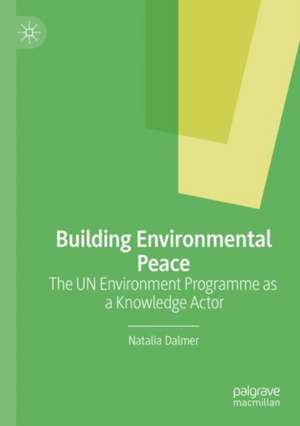Building Environmental Peace: The UN Environment Programme as a Knowledge Actor
Autor Natalia Dalmeren Limba Engleză Paperback – 19 mar 2023
| Toate formatele și edițiile | Preț | Express |
|---|---|---|
| Paperback (1) | 726.06 lei 6-8 săpt. | |
| Springer International Publishing – 19 mar 2023 | 726.06 lei 6-8 săpt. | |
| Hardback (1) | 730.02 lei 6-8 săpt. | |
| Springer International Publishing – 18 mar 2022 | 730.02 lei 6-8 săpt. |
Preț: 726.06 lei
Preț vechi: 885.44 lei
-18% Nou
Puncte Express: 1089
Preț estimativ în valută:
138.93€ • 145.35$ • 115.41£
138.93€ • 145.35$ • 115.41£
Carte tipărită la comandă
Livrare economică 03-17 aprilie
Preluare comenzi: 021 569.72.76
Specificații
ISBN-13: 9783030720964
ISBN-10: 3030720969
Pagini: 280
Ilustrații: XIX, 280 p. 13 illus.
Dimensiuni: 148 x 210 mm
Greutate: 0.4 kg
Ediția:1st ed. 2022
Editura: Springer International Publishing
Colecția Palgrave Macmillan
Locul publicării:Cham, Switzerland
ISBN-10: 3030720969
Pagini: 280
Ilustrații: XIX, 280 p. 13 illus.
Dimensiuni: 148 x 210 mm
Greutate: 0.4 kg
Ediția:1st ed. 2022
Editura: Springer International Publishing
Colecția Palgrave Macmillan
Locul publicării:Cham, Switzerland
Cuprins
Chapter 1: Introduction - (Old) Actors and (New) Issues In World Politics.- Chapter 2: Knowledge and International Bureaucracies.- Chapter 3: International Bureaucracies as Open Systems.- Chapter 4: Knowledge Creation by International Bureaucracies.- Chapter 5: A Note on the Research Approach.- Chapter 6: UNEP and the Evolution of Environmental Concerns - An Open System Perspective.- Chapter 7: “We can Count the Butterflies Later” - Knowledge Emergence, Agency, and Opportunity.- Chapter 8: UNEP and Environmental Peacebuilding.- Chapter 9: Conclusion: International Bureaucracies , Knowledge Creation, and Change.
Notă biografică
Natalia Dalmer is a researcher at the Institute of Political Science at Leibniz University Hannover, Germany. She works on international bureaucracies, knowledge, and environmental politics.
Textul de pe ultima copertă
“In this era of misinformation, disinformation and fake news, international organizations have an increasingly important role to play as generators, custodians and disseminators of knowledge. Dalmer shows how the United Nations Environment Programme (UNEP) is uniquely situated to make a positive global contribution in this regard. She illustrates in well-researched detail exactly how international bureaucracies become 'knowledge actors' and presents the UNEP as an open system that is crucial to the development of environmental peacebuilding. This book is an essential reference for anyone interested in UN knowledge and how this kind of knowledge may help us all save the planet.”
— Nanette Archer Svenson, Centro de Investigación Educativa (CIEDU), República de Panamá, USA
“Conceiving of international bureaucracies as actors in their own right and drawing from organizational theory and international relations literature, Dalmer illustrates their role as producers of new knowledge. With a focus on UNEP and the different environments from which the organization has obtained new insights regarding environmental peacebuilding, the book not only makes a timely contribution, but readers interested in international institutions and environmental studies will find it of great value.”
— Jutta M. Joachim, Radboud University, Nijmegen, Netherlands By analyzing the UN Environment Programme’s (UNEP’s) contribution to peacebuilding, this book aims to show how international bureaucracies develop knowledge and thereby come to matter on the world stage. Portraying UNEP as an open system, it explores how a growing understanding within the Programme of how environmental degradation shapes insecurities and vice versa has motivated its work on peacebuilding. The theoretical part of this book addresses knowledge, open systems, and knowledge creation. It then presents a historical discussion of UNEP’s development in an open system context. Finally, it investigates how knowledge emergence on the linkage between the environment, conflicts, and insecurities influenced UNEP’s interests and its work on environmental peacebuilding.
Natalia Dalmer is a researcher at the Institute of Political Science at Leibniz University Hannover, Germany. She works on international bureaucracies, knowledge, and environmental politics.
— Nanette Archer Svenson, Centro de Investigación Educativa (CIEDU), República de Panamá, USA
“Conceiving of international bureaucracies as actors in their own right and drawing from organizational theory and international relations literature, Dalmer illustrates their role as producers of new knowledge. With a focus on UNEP and the different environments from which the organization has obtained new insights regarding environmental peacebuilding, the book not only makes a timely contribution, but readers interested in international institutions and environmental studies will find it of great value.”
— Jutta M. Joachim, Radboud University, Nijmegen, Netherlands By analyzing the UN Environment Programme’s (UNEP’s) contribution to peacebuilding, this book aims to show how international bureaucracies develop knowledge and thereby come to matter on the world stage. Portraying UNEP as an open system, it explores how a growing understanding within the Programme of how environmental degradation shapes insecurities and vice versa has motivated its work on peacebuilding. The theoretical part of this book addresses knowledge, open systems, and knowledge creation. It then presents a historical discussion of UNEP’s development in an open system context. Finally, it investigates how knowledge emergence on the linkage between the environment, conflicts, and insecurities influenced UNEP’s interests and its work on environmental peacebuilding.
Natalia Dalmer is a researcher at the Institute of Political Science at Leibniz University Hannover, Germany. She works on international bureaucracies, knowledge, and environmental politics.
Caracteristici
Focuses on the question of how international bureaucracies become knowledgeable actors in world politics Interested in understanding how international bureaucracies develop knowledge and become experts Offers an analysis of the UN Environment Programme and UNEP’s Environmental Cooperation for Peacebuilding programme
